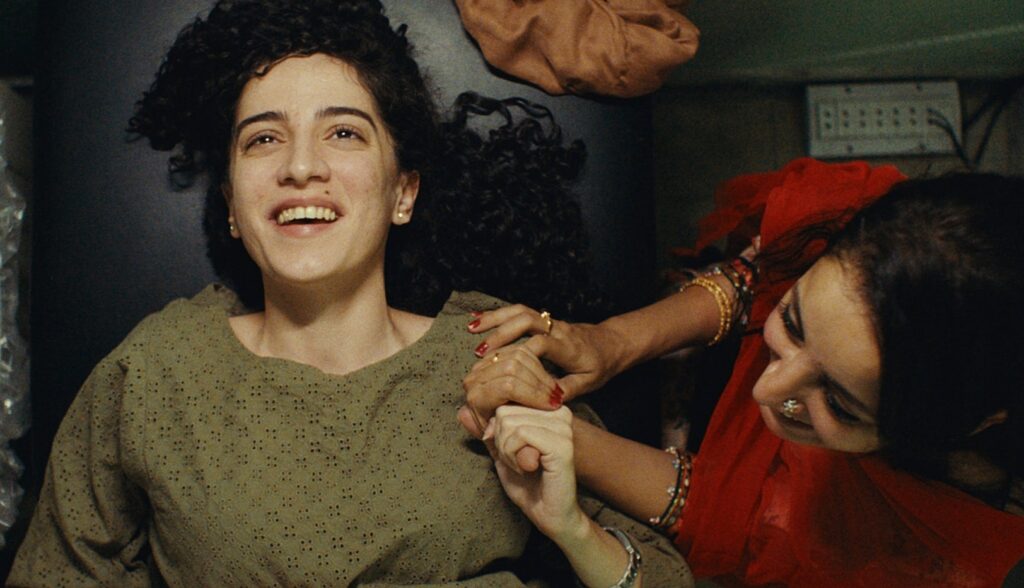Joyland, directed by Saim Sadiq, is one of the most important films to come out of Pakistan. It is a film that dares to focus on the oppressive nature of conformity in an unforgiving and regimented society, with hopes and dreams snuffed out by the harshness of an intrusive, rigid order. Its strength is its courage to tackle some salient home truths and deeply embedded societal hurdles that many who try to navigate end up irreparably damaged.
Written by Sadiq and Maggie Briggs, the film focuses on one of the thousands of ‘normal’ families in Lahore, Pakistan, with the head of the Rana family (Salmaan Peer) representing the social order. The family live in challenging times but can afford to slaughter a goat upon the expected birth of a grandson but who disappointingly turns out to be a girl. They have running water and enough to put food on the table. Rana’s family consists of two sons and their wives and four granddaughters. He yearns for a grandson as all families in Pakistan would. His younger son, Haider (Ali Junejo), is childless, jobless and helps around the house. He finally lands a job as a dancer in the background in one of the city’s popular theatre shows, staging bawdy dance performances for a lusting male audience. Haider’s main concern is that his father does not find out about his job as society frowns upon these stage shows as immoral and vulgar. It turns out that the performer he supports by dancing in the background is a transgender dancer, Biba (Alina Khan, an actual transgender performer), struggling to make it within the seedy yet vibrant stage scene. Biba carries herself fearlessly despite the odds stacked against her, and gradually, the meek and mild-mannered Haider begins to find a sense of strength through her, and an attraction develops between the two. Haider finds the forbidden fruit of Biba’s affection intoxicating, but their liaison has an air of inevitable fatalism…
Joyland unfolds by watching fragile human beings daring to dream only to find circumstances stifling their ambitions and thwarting their hopes. The bitter-sweet humorous tale makes way for rising melancholia, which engulfs to cloak the characters in a pallor of gloom. The film is a triumph for Pakistani cinema with its handling of mature situations and reality in a way that has never been the case in popular Pakistani movies. In a society steeped in suppression where nobody discusses personal issues, Joyland dares to handle those realities of life that remain brushed under the rug of silence. The handling of complex human realities are dealt with admirable subtlety and astuteness. It is a slow-burn experience that draws a viewer into the lives of imperfections and fragile humanity. It draws attention to how convention and norms erode individuality, spark and spirit, destroying souls along the way—obliterating hope and smothering dreams.
The movie is not about one storyline or thread in particular. In telling its tale, the film focuses on the predicaments facing numerous characters, particularly Haider’s wife, Mumtaz (Rasti Farooq), who takes pride in her job as a beautician of worth. Once Haider has a job, Rana orders her to leave her position and help with house chores, as that is the lot of every respectable woman, in an atmosphere where honourable women are caged at home to cook and produce male sons rather than aspire to have any dreams of their own. Her personality, smile, humor, radiance and self-confidence fade like a flickering candle in the wind. She yearns for release and passion and discovers it in a stranger’s forbidden romance, but that short-lived secret is discovered and leaves her humiliated, ultimately leading to a heartbreaking end. Even old man Rana, who finds himself with some tenderness at 70 with a neighboring widow (Sania Saeed), bows down to the “what will people say” syndrome.
The acting is uniformly formidable and restrained, eschewing the overly dramatic for subtlety and realism. A mention, too, for the evocative camerawork by Joe Saade and the haunting score by Abdullah Siddiqui. After its incredible reception at the Cannes film festival earlier this year, it is not inconceivable that Joyland could make history as the first-ever film from South Asia to make a major impact at the Oscars, especially given its setting, the subject matter, and the film’s undoubted excellence.
In Pakistan, the guardians of morality furiously attempted to deny local audiences a viewing of the film at the time of its release, citing its corruptive and dangerous influence on our pious and pure society. Men of virtue and unwavering faith inflict the rules on this utopia, and anything that falls foul of this rigid structure signals a threat to the order. In this highly patriarchal structure, women have no input at all. The weaker sex has its role defined by men, and a good, virtuous woman is the one who knows her place, one who follows but never leads. She is subservient and her dreams can only extend as far as men allow them to. Those who are gay or transgender are an aberration and sully the purity of our virtue. They must be erased or excluded, or if they are allowed to exist, it’s only to be mocked or ridiculed like carnival freaks.It comes as no surprise that the film has been compromised with some heavy-handed cuts and deliberately blurred at various points to avoid sexual situations.
Urdu, Punjabi, Drama, Color


